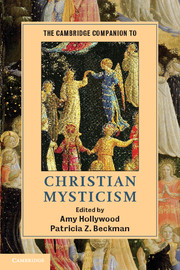Book contents
- Frontmatter
- Contents
- Contributors
- Introduction
- Part I Contexts
- Part II Key Terms
- Part III Contemporary Questions
- 13 Latin and the Vernaculars
- 14 Transmission
- 15 Writing
- 16 The Body and Its Senses
- 17 Mysticism and Visuality
- 18 Emotion
- 19 Authority
- 20 Gender
- 21 Sexuality
- 22 Time and Memory
- Select Bibliography of Christian Mystical Texts up to around 1750
- Select Bibliography of Modern Works Related to the Study of Western Christian Mysticism
- Author and Artist Index
- General Index
- References
13 - Latin and the Vernaculars
from Part III - Contemporary Questions
Published online by Cambridge University Press: 05 December 2012
- Frontmatter
- Contents
- Contributors
- Introduction
- Part I Contexts
- Part II Key Terms
- Part III Contemporary Questions
- 13 Latin and the Vernaculars
- 14 Transmission
- 15 Writing
- 16 The Body and Its Senses
- 17 Mysticism and Visuality
- 18 Emotion
- 19 Authority
- 20 Gender
- 21 Sexuality
- 22 Time and Memory
- Select Bibliography of Christian Mystical Texts up to around 1750
- Select Bibliography of Modern Works Related to the Study of Western Christian Mysticism
- Author and Artist Index
- General Index
- References
Summary
The year 1215 marks a watershed in church history, for in that year the Fourth Lateran Council decreed that all believers must confess their sins and receive the Eucharist at least once a year. Flanked by the founding of the Franciscan order in 1210 and the Dominicans in 1217, the decree “Omnis utriusque sexus” (“Everyone of either sex”) was more symbol than cause of the great pastoral initiative that had already been underway for half a century. No longer could “the Church” be conceptualized as a collective of priests, monks, and nuns, for henceforth the laity constituted the raison d’être of the clergy. It was to teach laypeople their faith, pray for them, nourish them with word and sacrament, absolve their sins, and in a word, save them, that “religious professionals” existed at all. Thus, in the wake of Fourth Lateran, it became possible and necessary to ask, with new urgency, just what was appropriate for a lay Christian to know.
This pastoral initiative coincided with the first stages of a far-reaching change in the relationship between Latin and Europe’s burgeoning vernaculars. Latin had been and would long remain the language of a learned elite – an international community including regular and secular priests, monks and nuns, friars, university students and teachers, clerics in secular employment such as court bureaucrats, and a sprinkling of humanist intellectuals. The language had a distinguished history stretching from Virgil to the latest scientific tract or papal bull, and its universality enabled texts written in Ireland to be read in Poland, and authors from Sweden to find an audience in Sicily or Spain. Although it had ceased well before 1000 to be anyone’s mother tongue, Latin functioned much as English now does to make a global community, or at least the idea of one, possible. But it had its limits. Like other classical languages (e.g., Hebrew, Arabic, Sanskrit), it was hard enough to learn that merely acquiring it conferred privilege, and its status as the medium of a sacred text assured the priority of writing over speech even among those who actually spoke it.
- Type
- Chapter
- Information
- The Cambridge Companion to Christian Mysticism , pp. 225 - 239Publisher: Cambridge University PressPrint publication year: 2012
References
- 1
- Cited by



